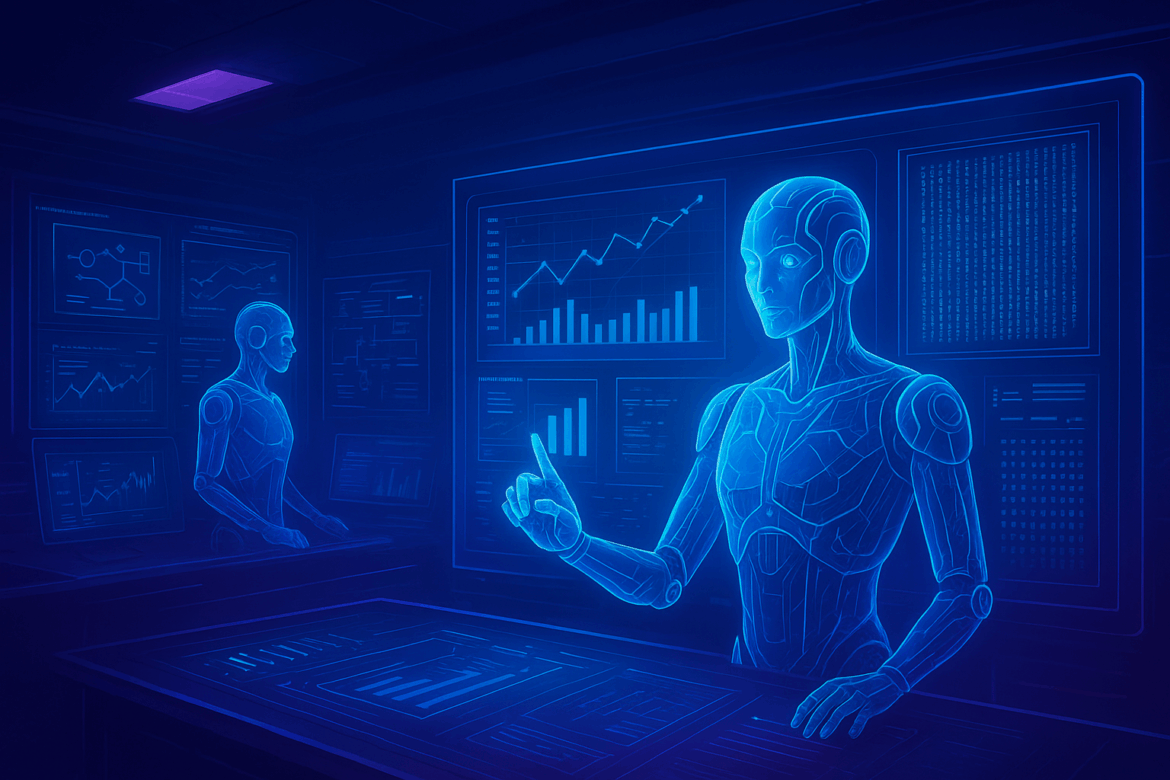Introduction
Today’s business landscape changes presenting numerous challenges to companies. Cyberattacks, data breaches sudden market shifts, and strict privacy regulations all require organizations to find smarter ways to operate. Two technologies have an impact on businesses’ ability to remain resilient, make smarter decisions, and safeguard their data: AI agents and synthetic data.
These technologies are no longer confined to the realm of future possibilities—they are practical tools that companies use to enhance operations, minimize risks, and prepare for what’s coming.
What Are AI Agents?
AI agents are smart computer programs that do tasks by themselves. Unlike regular software that follows strict rules, AI agents can learn from data, adjust to new situations, and make choices in real-time.
Key Benefits of AI Agents for Businesses:
- Quicker Choices: AI agents can look at tons of data fast and give useful advice.
- Better Productivity: By doing repeated tasks , AI agents save time and make fewer mistakes.
- Solving Problems : They can watch systems and spot issues like cyber threats before they cause harm.
Example: A store can use AI agents to guess how much stock they’ll need based on what’s selling well, which means less extra stuff and fewer losses.
What Is Synthetic Data?
Synthetic data is made-up information that mimics real-world data. Unlike actual data, it doesn’t contain personal or sensitive details making it ideal to use in testing, AI training, or running simulations.
Why Businesses Use Synthetic Data:
- Privacy Protection: Companies can study data without putting sensitive information at risk.
- Scalability: Organizations can build large datasets to train AI models.
- Safe Experimentation: Try out systems or new business plans without real-world dangers.
Example: Hospitals can use fake patient data to train AI models for spotting diseases without showing real patient files.
How AI Agents and Synthetic Data Work Together
When used together, AI agents and synthetic data have an impact on a company’s ability to bounce back from setbacks.
Main Benefits:
- Guessing What’s Next: AI agents that learn from synthetic data can play out different business situations, which helps companies get ready for surprises.
- Cutting Down on Problems: Always-on checking and looking ahead cut down on stops, mistakes, and money lost.
- Keeping Real Info Safe: Synthetic data makes sure private stuff stays private, but AI models can still learn what they need to.
- Pushing New Ideas: Companies can try out fresh thoughts, plans, or products without worry about real-world fallout.
Example: A manufacturing company can apply AI agents with synthetic data to forecast machine breakdowns and plan maintenance before any failure happens cutting down on time and expenses.
Real-World Applications
- Finance: Banks spot fraudulent transactions using AI agents trained on synthetic financial data.
- Healthcare: Hospitals train AI systems with synthetic patient data boosting diagnostics and treatment without risking privacy.
- Manufacturing: Factories use synthetic sensor data to anticipate equipment failures and streamline production.
- Cybersecurity: Companies recreate cyberattacks on synthetic data to train AI agents for improved threat detection.
Why This Has an Impact on Businesses
In today’s world where data holds great worth yet remains at risk, companies need tools that think fast, adjust , and keep things secure. By bringing in AI helpers and made-up data, businesses can:
- Get ahead of issues and setbacks
- Come to quicker well-informed choices
- Keep client and staff info safe
- Try new things without taking chances
Firms that jump on these tech advances now will be ready for what’s next, bounce back easier, and outdo their rivals down the road.
Conclusion
AI agents and synthetic data have a significant impact on how companies work in the digital era. They give businesses the tools to predict challenges, safeguard sensitive data, and make better choices. Any company that wants to remain competitive and strong in 2025 and later must adopt these technologies—it’s no longer a choice, but a necessity.
